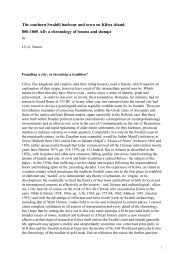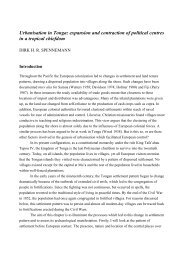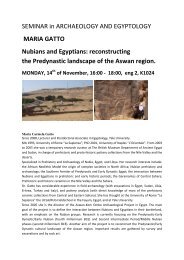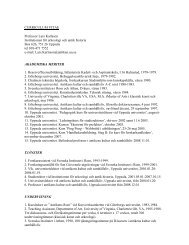Beowulf - Institutionen för arkeologi och antik historia
Beowulf - Institutionen för arkeologi och antik historia
Beowulf - Institutionen för arkeologi och antik historia
Create successful ePaper yourself
Turn your PDF publications into a flip-book with our unique Google optimized e-Paper software.
was a child. Today we would not count that as a reason. Similarly, when the King<br />
consents to <strong>Beowulf</strong> using the hall, he says:<br />
176<br />
Hafa nú ond geheald húsa sélest,<br />
gemyne mærþo, mægenellen cýð,<br />
waca wið wráþum!<br />
Have now and hold the best of houses<br />
remember your fame, show mighty valour,<br />
keep fiercely watch! (<strong>Beowulf</strong> vv. 658–660)<br />
From our point of view the King mentions the least important point first and the most<br />
important one last, however without emphasising it, and he does not mention the real<br />
problem, i.e., how to get rid of Grendel. His reference to <strong>Beowulf</strong>’s fame shows that<br />
the real reason for letting <strong>Beowulf</strong> use the hall is that he is a good man.<br />
When the King has reached a decision, this decision cannot be questioned even if<br />
there were reason to do so. In the <strong>Beowulf</strong> case nobody says that killing Grendel is<br />
not enough although many must have known that Grendel’s mother would try to<br />
avenge the attack on or the killing of her son. We can therefore conclude that in the<br />
courtroom format those who speak, those who are spoken to and those who listen<br />
are clearly defined and expected to act within the rather strict limits of given roles.<br />
The parallel between the hall and the church is obvious if we substitute the fire for<br />
the altar and the central part played by the Pagan meal for the equally central Christian<br />
communion. It is, moreover, significant that what is said from the upper part of<br />
the hall is most often a narrative that we can easily transform into a sermon or a<br />
homily, and that goes for Venantius as well as the <strong>Beowulf</strong> and the Maldon poet.<br />
The usage of good is clearly linked to the church production format and several of<br />
the narratives belonging to this format are structured by the word. The church format<br />
is first and foremost didactic, but it can naturally also be applied in the other formats.<br />
The same is true of the other formats, and that means that a change in a format may<br />
involve a fragment from another format. Hall competence is partly a matter of coping<br />
with different formats and people in the hall are in all probability expected to reflect<br />
on the homily even if it occurs in a courtroom format.<br />
The church format may also contain the talk that is involved with food activities.<br />
This is indicated by the fact that these activities are matched with the notion of eloquence<br />
as well as with ability to listen and negotiate. The talk in connection with<br />
handing out food invites comments from the guests in the hall and from Maldon we<br />
can infer that serving beer to the guests results in mutual promises to follow the code<br />
of the hall and to die for one’s master. This kind of response from the congregation<br />
no doubt belongs to the church format. Even the rib from a cow, found in Sigtuna<br />
with the inscription: The King gave most ... ...., may well be an example of the talk<br />
in the lower part of the hall during and just after events connected with the church








